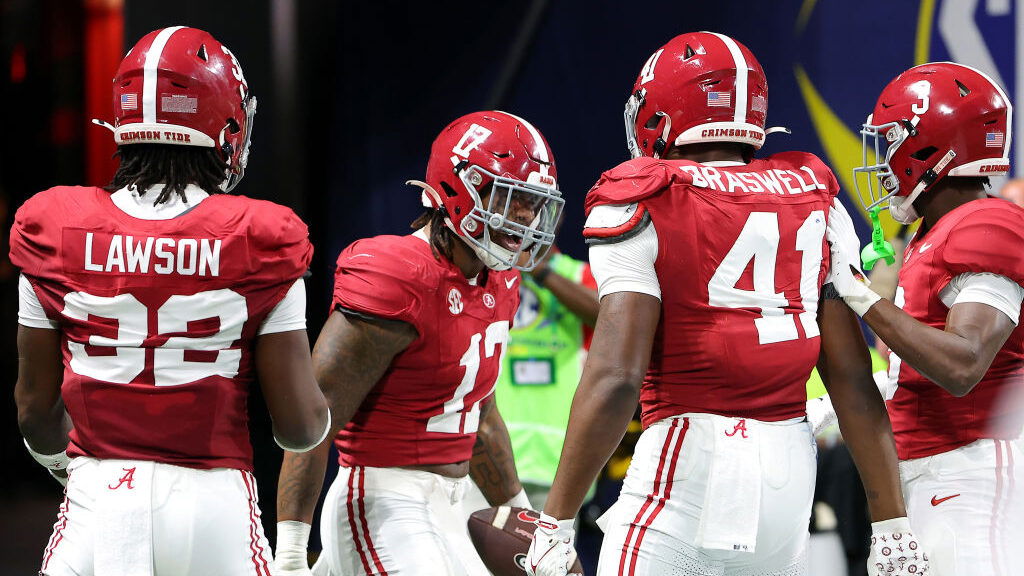
Getty
ATLANTA, GEORGIA – DECEMBER 02: Trezmen Marshall #17 of the Alabama Crimson Tide celebrates with teammates after recovering a fumble during the third quarter against the Georgia Bulldogs in the SEC Championship at Mercedes-Benz Stadium on December 02, 2023 in Atlanta, Georgia. (Photo by Kevin C. Cox/Getty Images)

Getty
ATLANTA, GEORGIA – DECEMBER 02: Trezmen Marshall #17 of the Alabama Crimson Tide celebrates with teammates after recovering a fumble during the third quarter against the Georgia Bulldogs in the SEC Championship at Mercedes-Benz Stadium on December 02, 2023 in Atlanta, Georgia. (Photo by Kevin C. Cox/Getty Images)
While Nick Saban may be the face of Alabama’s football dynasty, there was another driving force too, who made the engine that made it run. With his booming voice and relentless drive, he helped the team secure five national titles over 13 years, shaping champions through sheer strength and special teams grit. But on one side, this ex-Alabama coach’s energy shook the locker room; off it, he was quietly battling addiction. Though the game, he never gave up. Now, after a long struggle away from the field, he’s back as the head coach at West Alabama. And this time he’s not just aiming for wins; he’s determined to show that his story isn’t over—it’s just getting a second half.
Watch What’s Trending Now!
Back in 2012, as he helped Nick Saban to win consecutive national championships, Scott Cochran began a hidden struggle. Known as “Coach Yeah” for his loud, energetic personality, Cochran secretly battled debilitating migraine headaches. Despite trying blood thinners and beta-blockers, nothing helped. He turned to Vicodin and OxyContin—and by 2015, he was taking 10 pills a day just to function. The man, who motivated champions, was secretly struggling. What started as pain relief became a dangerous path that threatened to destroy his life.
But not anymore, as Scott Cochran is back, leading West Alabama and ready to show everyone who he is. And AL.com’s Iron Docs series reveals his battle with addiction and his journey back to the top as a first-time head coach. And the first cut captures the hype perfectly. “I’m the strength coach at Alabama. I’m doing ESPN 60 minutes; it’s doing a thing on me. I’m the strength coach of the year. Like everything is going right? I’m not going to get addicted to some pill,” Cochran said. And that’s exactly what happened.
ADVERTISEMENT
View this post on Instagram
A man who only cared about success stood vulnerable in front of his addiction. Even a new beginning at Georgia in 2020 couldn’t quell his struggles. Scott Cochran, the special teams coordinator, fought his inner demons, but his addiction persisted. It all culminated in an overdose during the COVID lockdown.
Then in 2021, Cochran took a break from coaching to focus on recovery. He returned as an analyst later that year, but the addiction lingered. In late 2023, he relapsed, secretly using painkillers again. “My kids paid the ultimate price, and my wife did too. Pay the ultimate price. God gave me this voice, and now you know. What am I going to do? You?” Cochran added. In February 2024, Cochran re-entered rehab, this time resolved to overcome his challenges and take control of his future.
ADVERTISEMENT
Scott Cochran’s story of resilience reaches a new peak on February 3, 2025, as he steps into the head coaching role at West Alabama. Having fought a long, private battle with addiction, Cochran’s coaching is now a mission. He’s actively sharing his experience, speaking candidly about relapse, self-importance, and recovery to teams such as Georgia Tech, Florida, and Clemson. But he didn’t just stop at that; he made sure he did something that actually made a difference.
ADVERTISEMENT
Scott Cochran’s ultimate move towards redemption
On August 16th, Scott Cochran addressed a college football team, but not as a coach. Instead, he spoke candidly to the players. Georgia Tech’s head coach, Brent Key, who had worked with Cochran at Alabama for three years, invited him to talk about substance abuse. “As men, we hide things,” Key said. “That’s what we’re supposed to do. We’re supposed to hide things, not let people know when we’re hurt… So, what you have to do is pay attention. Scott’s going to be very transparent and open with you guys tonight.”
Well, Cochran’s presentation was direct and honest. He shared his personal story for 42 minutes, covering his successes and the lows of addiction. He incorporated segments from his 60 Minutes interview, a Regions Bank commercial, and a video of him destroying a CFP runner-up trophy. “I’m making the money. Life’s good,” Cochran told them. “I wouldn’t be standing here if it was sunshine and rainbows, right? I relapse. I pick back up last year because my ego got so big… you couldn’t tell me s—, and so I picked back up. But having faced his own struggles, Scott Cochran is determined to prevent others from suffering the same fate.
Top Stories
Tiger Woods’s GF Vanessa Trump and Daughter Kai Steal the Spotlight at His 50th Birthday Bash

Travis Kelce Announces New Career Move Away From Chiefs After Confirming Retirement Stance

Illegal Fight Sparks Chaos at Chili Bowl Nationals Leaving Team Member Struggling to Breathe

Tragic Death of Shaq & Kobe’s Ex-Teammate Linked to Fatal Mistake, Authorities Confirm

Ben Roethlisberger Announces Stance on Accepting Steelers Job After Making Coaching Demands to Front Office

Bryson DeChambeau Has Bad News for LIV Golf & PGA Tour as He Considers Alternate Career Path

In June 2024, he co-founded the American Addiction Recovery Association (AARA), aiming to break the stigma surrounding addiction and provide tangible paths to recovery. Through AARA, he’s building a platform dedicated to saving lives, reuniting families, and fostering open dialogue about substance abuse. Fueled by his past, Cochran now focuses on connection, healing, and purpose, demonstrating that his personal recovery has sparked a movement to help others overcome their challenges. Now, with a clear vision and goal in his mind, Scott Cochran is all ready to make an impact this season.
ADVERTISEMENT
ADVERTISEMENT
ADVERTISEMENT
ADVERTISEMENT

